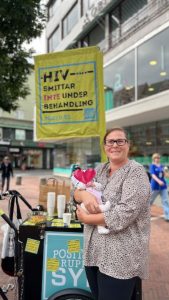 Wanting to Become a Parent While Living with HIV – An IVF Journey
Wanting to Become a Parent While Living with HIV – An IVF Journey
Wanting to become a parent while living with HIV has long involved practical and ethical obstacles when accessing fertility care. In recent years, however, legislation, medical evidence, and the organization of care have all clearly moved toward increased accessibility.
At Karolinska University Hospital, a pilot study has been conducted since 2018, allowing women living with HIV to access assisted reproduction. Initially, this applied to IVF, and since 2021, it has also included insemination, which has opened opportunities for single women as well. Importantly, participation is not limited to women in Stockholm; patients from across the country can be referred to the study. To qualify, well-documented viral control, effective treatment, and stable follow-up are required, and once these criteria are met, there are essentially no medical reasons to deny access.
The main obstacles, however, can be waiting times, the availability of donated gametes, and the sometimes complicated path through referrals and the varying procedures of different regional healthcare systems. For those needing donated sperm, the wait can be around nine months until the first appointment, with additional time before treatment can begin. Women living with HIV are placed in the same queue as everyone else, but the path may feel even longer because they have already had to fight for their place in care from the start. Sweden has made significant progress in recent years: since 2016, single women can apply for IVF, and from 2019, it has also been permitted to use donated eggs and sperm. This means doors that were previously closed are now open, but in practice, resources, priorities, and knowledge within healthcare still play a significant role.
For us at Positiva Gruppen Syd, it is important to highlight both the structural progress that has made pregnancies safer and the personal experiences that show what it is actually like to live with HIV and go through a fertility journey. At its core, this is about people’s right to shape their lives and their future. On that note, we are incredibly happy to welcome our latest and youngest member, little H, who was born in July and is now six weeks old. They are the result of a long and hopeful journey toward parenthood and remind us all why knowledge of and access to fertility care is so important. In the coming months, we will share more about the path that brought this family here—questions about age, health, and treatment, costs, but also the perseverance and longing that drove them forward.